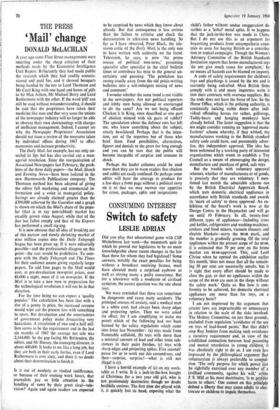' Mail' change
THE PRESS DONALD McLACHLAN
A year ago some Fleet Street managements were smarting under the sharp criticism of their methods made by the Economist Intelligence Unit Report. Reluctantly they had made public the research which they had readily commis- sioned and paid for, and it showed bouquets being handed by the EIU to Lord Thomson and Mr Cecil King with one hand and boxes of pills to Sir Max Aitken, Mr Michael Berry and Lord Rothermere with the other. if the word 'pill' can still be used without misunderstanding, it should be said that the proprietors have taken their medicine like men and that very soon the unions of the newspaper industry will no longer be able to obscure their own shortcomings with charges of inefficient management. Indeed, I cannot see why the Newspaper Proprietors' Association should not issue a review of the measures taken by individual offices during 1967 to effect economies and increase productivity.
The Daily Mail, for example, has not only un- sealed its lips but has also carried out a man- agerial revolution. Since the reorganisation of Associated Newspapers last February, the prob- lems of the three daily papers—the Mail, Sketch and Evening News—have been isolated in the new Harmsworth Publications company. The Thomson method has been adopted of giving the editor full marketing and commercial in- formation and a voice in managerial policy. Savings are already claimed greater than the £300,000 achieved by the Guardian and a graph is shown on which the Mail's share of the popu- lar (that is to say non-tabloid) market has steadily grown since August, while that of the Sun has fallen steeply and that of the Express has performed a small zig-zag.
It is now obvious that all idea of breaking out of this narrow and slowly shrinking market of nine million copies into the Daily Telegraph league has been given up. If it were editorially possible—and the professionals disagree on this point—the cost would be prohibitive. To com- pete with the Daily Telegraph and The Times for their audience means giving regularly larger papers. To add four pages to the Mail would cost, at pre-devaluation newsprint prices, over £6,000 a night, most of it on newsprint. If the Mail is to take a new turn in preparation for the technological revolution it will not be in that direction.
For the time being we can expect a 'quality popular.' The calculation has been that with a rise of a penny in price, the increased revenue would wipe out the present loss with something to spare. But devaluation and the uncertainties of government policy make forecasting very hazardous. A circulation of two and a half mil- lion seems to be the requirement and in the last six months of 1967 the average net sale was 2,144,000. So the gap facing Mr Brittenden, the editor, and Mr Hussey, the managing director, is about 400,000. It looks to me like a long job, but they are both in their early forties, even if Lord Rothermere is over sixty, and there is no doubt about their determination to finish it.
Is it out of modesty or studied indifference, or because of their evening work hours, that journalists pay so little attention to the handling of news by their great rival—tele- vision? Again and again readers are expected to be surprised by news which they know about already. But that consequence is less serious than the failure to criticise and check the deterioration in television news handling. So far as I have observed, Peter Black, the tele- vision critic of the Daily Mail, is the only one to have written with authority on the trend. Television, he says, is now 'the prime source of political non-news,' presenting specialist after specialist in the chief bulletin times to contribute his mite to the general un- certainty and guessing. 'The pendulum has swung crazily away from the old precis-writing bulletins into a self-indulgent mixing of news and comment.'
I wonder whether the same trend is not visible in the newspapers. Are not political reporters and lobby men being allowed or encouraged to do the same? Are we not being offered Chicken a la King, once described as one part of chicken minced with six parts of rabbit? The speculation about the defence cuts has left me, who know something about the subject, utterly bewildered. Perhaps that is the inten- tion, not of the reporters but of those who brief them. Feed possibilities, alternatives, figures and denials to the press for long enough and you can be sure that the public will become incapable of surprise and immune to shock.
Perhaps the leader columns could be used more than they are to warn readers that chicken and rabbit are easily confused. Or perhaps some editor will have the courage to produce for a few days a front page without a political story on it so that we may recover our appetites for crises, packages, splits and resignations.


































 Previous page
Previous page